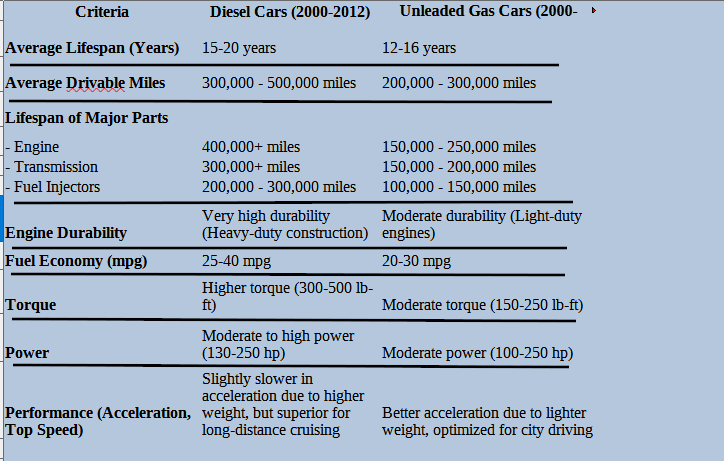Charts! Science! Running the Numbers on Diesel Engines!
1/8/20253 min read


A Look at Diesel Cars vs Unleaded Gas Cars (2000-2012): Durability, Performance, and More
When it comes to choosing a car that’ll last, fuel economy, and overall performance, folks in the Midwest often wonder about the difference between diesel cars and their unleaded gas counterparts. Both options come with their perks and challenges, especially when you’re considering vehicles made between 2000 and 2012. Whether you’re looking for something with a long lifespan for those long drives across the flatlands or a car that’s cheaper to maintain in the city, it’s important to understand how each type stacks up in key areas.
1. Average Lifespan: Which Lasts Longer?
In terms of longevity, diesel engines have the edge. Most diesel vehicles from 2000 to 2012 can last anywhere from 15 to 20 years, with some even reaching up to 500,000 miles if properly maintained. In contrast, most unleaded gas cars tend to last 12 to 16 years and generally go up to 300,000 miles before major parts start to wear down. Diesel engines are built with more robust components, which contribute to their longer life expectancy.
2. Lifespan of Major Parts: What’s the Difference?
Diesel engines are known for their durability, and this extends to the major parts as well. For example:
Engines in diesel vehicles can last well over 400,000 miles, while unleaded engines may only make it 150,000 to 250,000 miles.
Transmissions in diesel cars also hold up longer, going up to 300,000 miles, while gas car transmissions tend to need repairs after around 150,000 to 200,000 miles.
As for fuel injectors, diesel models are a bit tougher, lasting 200,000 to 300,000 miles, compared to 100,000 to 150,000 miles in gasoline-powered cars.
If you’re someone who keeps a car for a long time, these longer-lasting parts might sway your decision.
Here’s a detailed breakdown of engine components' life expectancy in diesel vs gasoline cars.
3. Engine Durability: Tough or Lightweight?
Diesel engines are built to handle a lot more stress than their gasoline counterparts. The heavy-duty construction of diesel engines means they can take on higher stress and run for longer periods without breaking down. This makes them perfect for people who put a lot of miles on their vehicles, like truck drivers and those who live in rural areas where long-distance driving is common.
Check out diesel engine durability and why they’re built for tough jobs.
4. Fuel Economy: Which One Saves You More?
Fuel economy is another big factor in choosing between diesel and unleaded cars. Diesel engines are more efficient, typically offering 25 to 40 mpg depending on the vehicle and driving conditions. Meanwhile, unleaded cars tend to get around 20 to 30 mpg.
Explore more about diesel vs. gasoline fuel economy here.
5. Performance: Torque and Power
Diesel engines usually provide more torque, which is the force that helps a vehicle accelerate and haul heavy loads. You can expect 300 to 500 lb-ft of torque in many diesel models from 2000 to 2012. This gives diesel vehicles an edge in towing capacity and stability when you’re hauling something heavy.
As for power (horsepower), diesel vehicles often provide a range of 130 to 250 hp. Gasoline engines, on the other hand, usually offer less torque (about 150 to 250 lb-ft) but are often quicker to accelerate, making them a better choice for those who need speed around town.
Read more on how diesel torque compares to unleaded power.
6. Fuel Prices: Which One Is Cheaper?
In general, diesel fuel tends to be more expensive than gasoline, especially in the U.S. However, because diesel engines are more fuel-efficient, the overall cost per mile can still be lower, depending on your driving habits. In places where diesel fuel is more common, such as rural Midwestern towns, you might see better pricing.
Learn about diesel fuel pricing trends and how they affect your budget.
Choosing between a diesel car and an unleaded gas car depends on your driving needs. Diesel cars are the better option if you’re planning to keep your vehicle for the long haul, need better towing capacity, and do a lot of highway driving. On the other hand, if you’re mostly commuting around the city, want to spend less on maintenance, and don’t mind filling up more often, an unleaded gas car might be the way to go.
For anyone in the Midwest who likes their road trips, have lengthy commutes or just want an engine that can do an extra few hundred thousand miles in it's life time- check out diesel cars like the models by Volkswagen.
Did you know Volkswagen set the Guinness World Record for highest Miles Per Gallon? Check THIS out.
